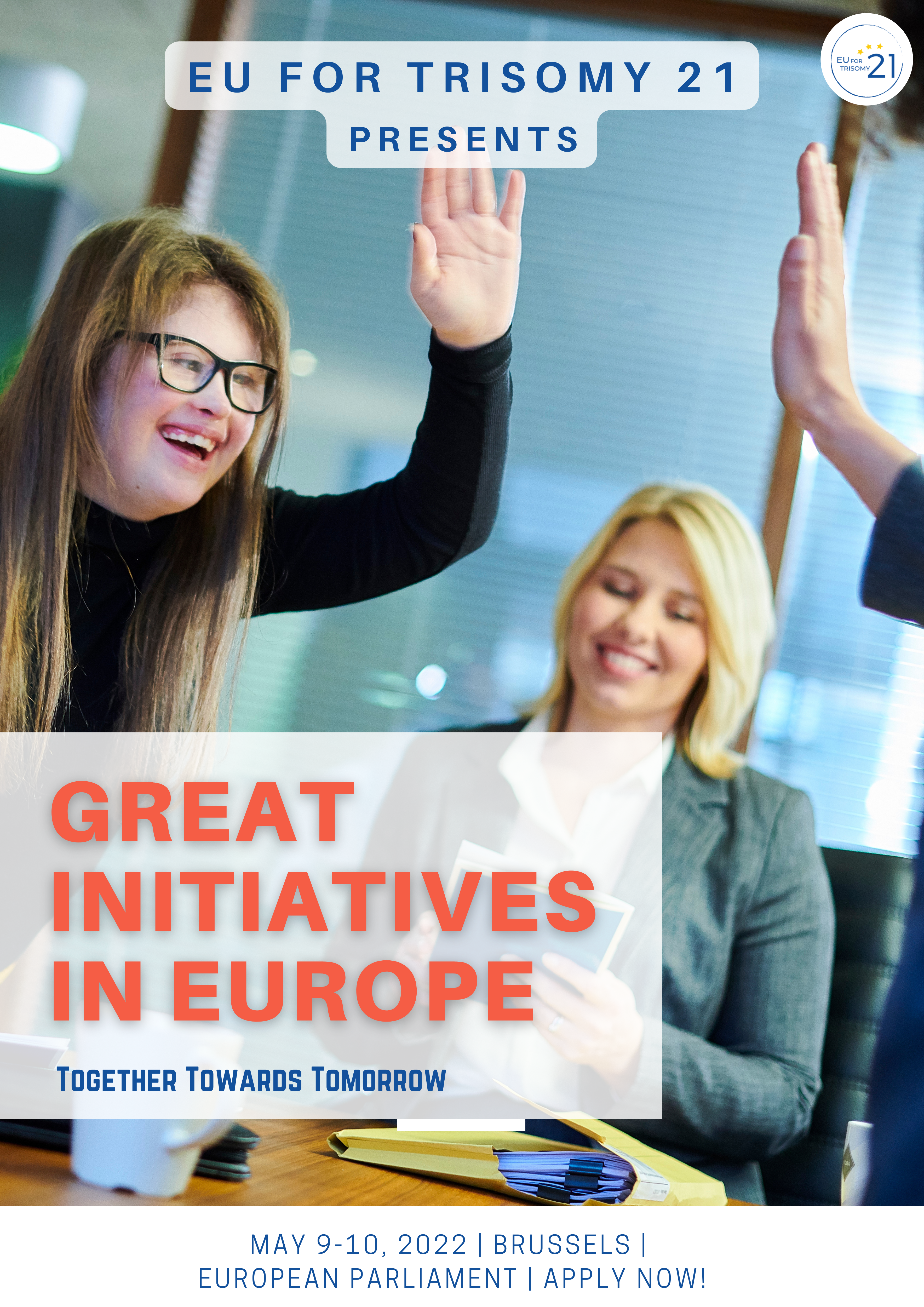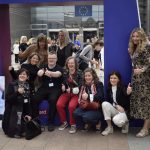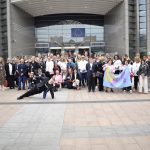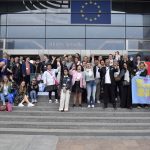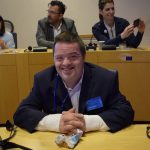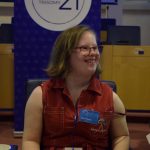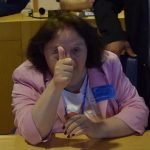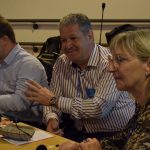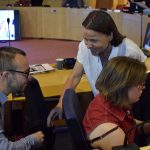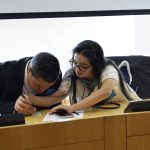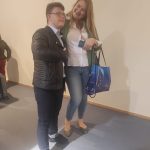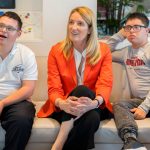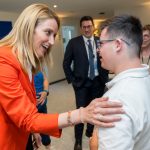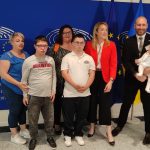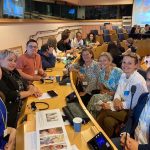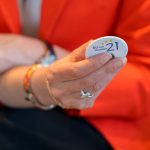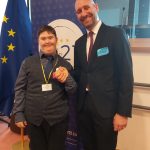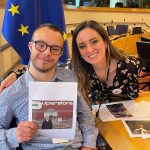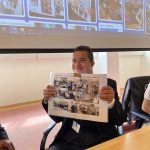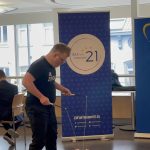EU for Trisomy 21 at the European Parliament
Finally, after two years of remote work, EU for Trisomy 21 was able to gather In-Person for the first time in Brussels.
The #GreatInitiatives in Europe conference gave the EU for Trisomy 21 network the opportunity to meet their EU representatives, exchange good practices and finally meet in person for the first time in two years to belatedly raise the literal as well as figurative glass in honor of World Down Syndrome Day.
67 representatives of our network, including representatives of different NGOs, Parents and 17 People with Down Syndrome came to the European Parliament to participate in thematic seminars on Employment and Job Opportunities, Visibility and Non-Discrimination, as well as Parenthood and Family Life. In total representing 12 European countries, the participants were able to sit down in personal meetings with over 30 Members of the European Parliament.
Among the participants were also representatives of the incredible grass-roots initiatives that EU for Trisomy 21 was able to highlight throughout the #GreatInitiatives Campaign of this year’s World Down Syndrome Day.
Welcoming Cocktail
The event started on Monday 9th of May in the evening with a welcoming cocktail and an Award Ceremony of the #GreatInitiatives Campaign. Trophies were given to the three most voted initiatives of the #GreatInitiatives campaign: Santhe Fitoceainarie from Romania, La Ruche – Artisanal workshop from France and Weaving Lives from Spain.
Two special prices were awarded to the initiatives Von Mutter zu Mutter (From Mom to Mom) from Germany and to the Úsmev prosím projekt (Smile please project) from Slovakia for their inspirational work in the past year. The rest of the #GreatInitiatives from EU for Trisomy 21’s World Down Syndrome Campaign can be found here.
In harmony with the #GreatInitiatives Campaign, EU for Trisomy 21 made an effort to include local #GreatInitiatives throughout the conference. The catering service of the Welcome Cocktail was provided through Cap Events, a local catering service that exclusively hires people with intellectual disabilities to work as service staff.
Pictures and videos of the cocktail can be found in the gallery below.
Thematic seminars in the European Parliament:
The following day, Tuesday, 10th May, the participants were invited by MEP Anne-Sophie Pelletier to enter the European Parliament and hold the morning workshops, marking this conference one of the first outside events hosted in the Parliament since the beginning of the Covid-19 pandemic.
The participants were able to choose between three main workshops on the following topics: Employment and Job Opportunities, Visibility and Non-Discrimination, and Parenthood and Family Life. These workshops, lead by Network and Project Manager Elisabeth Gudenus, gave the participants the opportunity connect in small groups of 5-7 people and debate on the different situations of these issues throughout their respective European Countries, exchange good and bad practices and confer with each other on how to make a difference. The conclusions of each group were written in post-its to be put together in a general poster that you can see here.
During the next weeks EU for Trisomy 21 will publish the conclusions of each of the groups of parents and people with Down Syndrome.
After a first round of exchanges, a fourth workshop was offered for participants who wanted to engage more creatively in the conference. Lead by Stana Schenck, Co-Initiator of the inclusive Erasmus Projects WirfürVielfalt and Me and Your Stories, as well as Co-Founder of inclution.org, this workshop was lead in a non-verbal manner, giving especially the participants with Down Syndrome the opportunity to engage with each other even without speaking a common language.
Conclusion ceremony:
The conclusion ceremony was hosted by Member of the European Parliament Miriam Lexmann, who invited the entire participant group to a standing lunch, giving a small presentation on the importance of inclusion of people with disabilities in the EU discourse.
After a brief speech from Antonio Rosique the coordinator of EU for Trisomy 21, Natalie Dedreux, an activist and journalist with Down Syndrome from Germany, gave a speech on her personal experiences. Only 23 years old, Natalie has worked tirelessly over the last few years to raise awareness for some of the issues people with Down Syndrome are facing on a daily basis. This includes discrimination in the job market with no access to equal pay, the lack of representation of people with Down Syndrome in the general public landscape leading to misconceptions about the entire community, and her worries about the pre-natal blood test being paid for by the general health insurance and its effect of less and less people with Down Syndrome being born. Here is the entire text of her speech.
Meetings with Members of the European Parliament:
Throughout the whole afternoon all the national delegations from EU for Trisomy 21 participated in political meetings with members of the European Parliament from across all political parties. More than thirty deputies from the twelve represented European countries were present.
During these meetings the national delegations of EU for Trisomy 21 were able to present some of the incredible projects from the #GreatInitiatives campaign of the World Down Syndrome Day which can be found here. Also, after having spent the morning reviewing some of the most pressing issues people with Down Syndrome are facing across Europe, and especially in their country, they were able to give a first-hand account.
Overall, these concerns while differing in degree and details in each respective European Country, can be split into three main categories:
- Discrimination: not been treated equally in many (if not all) the aspects of their lives in education in the health sector on research or even for the service providers
- Employment: People with Down Syndrome suffer heavily from unemployment and not much governmental support is focused on helping them out of unemployment. The European Union has the power to support special programs to promote employment of people with intellectual disabilities and they should prioritize this.
- Easy language: to access any public or private service in the European Union and to participate in the general society people with Down Syndrome need the spread of use of easy language. This type of language could facilitate the comprehension of political debates and social life and is a pre-condition for the full integration of people with Down syndrome into the society.
EU for Trisomy 21 was also able to sit down more than 1 hour with the President of the European Parliament Roberta Metsola. She welcomed the participants from EU for Trsiomy 21’s Coordinator Antonio Rosique, as well as the Conference’s Maltese delegation in her office and listen to their demands.
About Eufortrisomy21.eu
A platform for the collaboration of associations, citizens and politicians working together for the celebration of World Down syndrome Day, to make visible the intellectual disability in general and persons with trisomy 21 in particular (most common intellectual disability of genetic origin, also called Down syndrome).
